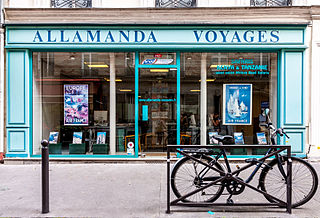Related Research Articles

Indonesia's transport system has been shaped over time by the economic resource base of an archipelago with thousands of islands, and the distribution of its more than 200 million people concentrated mainly on a single island, Java.
PJSC Aeroflot – Russian Airlines, commonly known as Aeroflot, is the flag carrier and the largest airline of Russia. The airline was founded in 1923, making Aeroflot one of the oldest active airlines in the world. Aeroflot is headquartered in the Central Administrative Okrug, Moscow, with its hub being Sheremetyevo International Airport.

A travel agency is a private retailer or public service that provides travel and tourism-related services to the general public on behalf of accommodation or travel suppliers to offer different kinds of travelling packages for each destination. Travel agencies can provide outdoor recreation, arranging logistics for luggage and medical items delivery for travellers upon request, public transport timetables, car rentals, and bureau de change services. Travel agencies can also serve as general sales agents for airlines that do not have offices in a specific region. A travel agency's main function is to act as an agent, selling travel products and services on behalf of a supplier. They are also called Travel Advisors. They do not keep inventory in-hand unless they have pre-booked hotel rooms or cabins on a cruise ship for a group travel event such as a wedding, honeymoon, or other group event.
Sabre Global Distribution System, owned by Sabre Corporation, is a travel reservation system used by travel agents and companies to search, price, book, and ticket travel services provided by airlines, hotels, car rental companies, rail providers and tour operators. Originally developed by American Airlines under CEO C.R. Smith with the assistance of IBM in 1960, the booking service became available for use by external travel agents in 1976 and became independent of the airline in March 2000.
A passenger name record (PNR) is a record in the database of a computer reservation system (CRS) that contains the itinerary for a passenger or a group of passengers travelling together. The concept of a PNR was first introduced by airlines that needed to exchange reservation information in case passengers required flights of multiple airlines to reach their destination ("interlining"). For this purpose, IATA and ATA have defined standards for interline messaging of PNR and other data through the "ATA/IATA Reservations Interline Message Procedures - Passenger" (AIRIMP). There is no general industry standard for the layout and content of a PNR. In practice, each CRS or hosting system has its own proprietary standards, although common industry needs, including the need to map PNR data easily to AIRIMP messages, has resulted in many general similarities in data content and format between all of the major systems.
Hahn Air is a minor German airline headquartered in Dreieich, offering business jet scheduled and charter flights within Europe from its base at Düsseldorf Airport.

An electronic ticket is a method of ticket entry, processing, and marketing for companies in the airline, railways and other transport and entertainment industries.

A round-the-world ticket is a product that enables a traveller to circumnavigate the world on a single itinerary. RTW tickets in the past were generally offered through marketing agreements between airlines on several continents. Now, they are generally offered by airline alliances such as SkyTeam, Star Alliance and Oneworld, or by specialist travel agencies that will plan a custom trip for the consumer. Prices vary but are generally in the range of US$2,500–6,000 for an economy class ticket and US$5,000–14,000 for business class. An alternative for a round-the-world ticket is a continent pass.

Amadeus IT Group, S.A. is a major Spanish multinational technology company that provides software solutions for the global travel and tourism industry. It is the world's leading provider of travel technology that focus on developing software for airlines, hotels, travel agencies, and other travel-related businesses to enhance their operations and customer experiences.
Interlining, also known as interline ticketing and interline booking, is a voluntary commercial agreement between individual airlines to handle passengers traveling on itineraries that require multiple flights on multiple airlines. Such agreements allow passengers to change from one flight on one airline to another flight on another airline without having to gather their bags or check-in again. Airlines can also promise free rebooking if the connection is lost due to a delay.

An airline ticket is a document or electronic record, issued by an airline or a travel agency, that confirms that an individual is entitled to a seat on a flight on an aircraft. The airline ticket may be one of two types: a paper ticket, which comprises coupons or vouchers; and an electronic ticket.
Airline reservation systems (ARS) are systems that allow an airline to sell their inventory (seats). It contains information on schedules and fares and contains a database of reservations and of tickets issued. ARSs are part of passenger service systems (PSS), which are applications supporting the direct contact with the passenger.

Civil aviation is one of two major categories of flying, representing all non-military and non-state aviation, both private and commercial. Most countries in the world are members of the International Civil Aviation Organization and work together to establish common Standards and Recommended Practices for civil aviation through that agency.
Travicom was the trading name of Travel Automation Services Ltd, a travel technology company based in the United Kingdom providing a global distribution system between airlines and travel agencies.
The United States has an extensive air transportation network. In 2013, there were 86 airports in the U.S. that annually handled over 1,000,000 passengers each. The civil airline industry is entirely privately owned and has been largely deregulated since 1978, while most major airports are publicly owned. The three largest airlines in the world by passengers carried are U.S.-based; American Airlines is number one after its 2013 acquisition by US Airways. Of the world's 50 busiest passenger airports, 16 are in the United States, including the top five and the busiest, Hartsfield–Jackson Atlanta International Airport. In terms of cargo, in 2015, eight of the world's thirty busiest airports were in the U.S., including the world's second-busiest, Memphis International Airport, just behind Hong Kong International Airport in Hong Kong. Private aircraft are also used for medical emergencies, government agencies, large businesses, and individuals.

TravelSky Technology Limited is the dominant provider of information technology services to the Chinese air travel and tourism industries. Its clients include airlines, airports, air travel suppliers, travel agencies, individual and corporate travel consumers and cargo services. It is listed on the Hong Kong stock exchange and its majority shareholder or parent group is the China TravelSky Holding Company, a State-owned enterprise (SOE).
The Electronic Miscellaneous Document (EMD) is an International Air Transport Association (IATA) standard for electronically documenting ancillary revenue; that is, all other sales and transactions between airlines and passengers besides electronic tickets. It is a step toward moving the airline industry to purely electronic transactions in the business-to-consumer context.

The Airlines Reporting Corporation (ARC) is a company that provides ticket transaction settlement services between airlines and travel agencies and the travel management companies that sell their products in the United States. ARC, which is owned by nine major airlines, also offers its transactional data within various industries. In 2019, ARC processed more than $97.4 billion worth of transactions for its customers.
The passenger movement charge (PMC) is an Australian tax payable by passengers departing Australia on international flights or sea transport, whether or not the passenger intends to return to Australia. The PMC was introduced in July 1995 and was initially described as a charge to partially offset the cost to government of the provision of passenger facilitation at airports, principally customs, immigration and quarantine functions, and the justification has changed each time it was increased. Since 2012, no justification for increases in the PMC has been given.

The COVID-19 pandemic has had a significant impact on the airline industry due to travel restrictions and a decimation in demand among travelers.
References
- ↑ "Billing and Settlement Plan (BSP)". International Air Transport Association.
- ↑ "Sabre's Getting Started FAQs". Sabre.